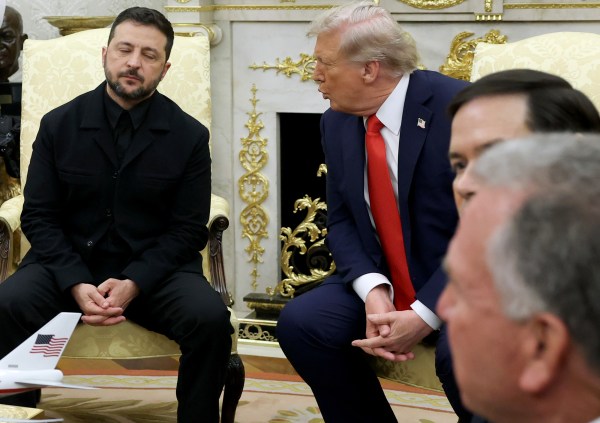In 1965, William F. Buckley, the founder of National Review magazine and, as much as anyone, of modern American conservatism, ran for mayor of New York City. It was a quixotic endeavor. When asked what he’d do if he won, he responded, “Demand a recount.”
Buckley ran, in other words, not to win a campaign but to win an argument. It was a three-way race, but he really had only one opponent: John Lindsay, the Republican candidate. Lindsay was a liberal Republican back when that didn’t sound oxymoronic.
Buckley ran partly for fun but also to argue that there was no difference between the Republican and Democratic parties in New York — and perhaps nationally.
From Buckley’s vantage point, the only reason Lindsay was running as a Republican was expediency. If being a Democrat shortened the climb to power, Lindsay would have called himself a Democrat (which he eventually did).
The prior year, the GOP was crushed in a presidential election defeat of historic proportions. Lyndon Johnson trounced Barry Goldwater, the leader of what was then still called “the New Conservatism,” with 61 percent of the popular vote and 486 electoral votes. Goldwater’s defeat had much to do with the emotional fallout from the Kennedy assassination, but the margin of his loss was due to centrist and liberal Republicans refusing to back his candidacy.
Buckley’s mayoral run signaled that the conservative project was not dead. Fifteen years later, Ronald Reagan’s presidential victory was a win for the GOP nationally and a triumph for conservatives within the GOP.
I bring all of this up to set the stage for something Buckley said in 1965. “For some people,” he declared, “politics is the ultimate concern. Of them, it can be said they are serious about politics, in the sense in which Mr. John Lindsay is serious about politics. He is as serious about politics as, for instance, a flagpole-sitter is serious about flagpoles. Politics sustains Mr. Lindsay, even as the flagpole sustains the flagpole-sitter. Others care less for politics than for the end of politics. We climb flagpoles, but only in order to look at the horizon.”
Conservatives climbed to the top of the GOP as a means to an end: to move American politics toward a more conservative horizon. They had their victories, from Reagan’s Cold War triumph to the rise of the conservative legal movement to the rejection of sclerotic economic policies that bedeviled many other democratic nations.
The conservative takeover also had a number of failures. One not often discussed is that it helped fuel the ideological polarization of our politics. In 1965, if you asked someone if they were a Republican or a Democrat, you’d need to ask a follow-up question to find out if they were a conservative or a liberal. Not anymore.
This is a failure, not because the right is solely to blame or because polarization is the worst thing in the world. It was a failure because the whole point of the takeover wasn’t to have the GOP as a plaything or a jobs program for right-wingers, but to actually move the country rightward. And that requires using the party to persuade people to join it, and by extension the conservative cause.
Polarization, particularly driven by our primary system and the media climate, makes persuading those not already on the team not only harder but also harmful to your job security, for Republican politicians and conservative commentators alike. Better to keep riling up your own side and sit safely atop your pole.
Whereas Buckley’s generation saw the party as a tool for conservative gains, today’s ambitious Republicans see conservatism as a malleable tool for personal and partisan gain. They proclaim that the conservatism of Buckley and Reagan has outlived its usefulness, as have such horrors as “market fundamentalism” — a fancy new term used by some GOP pols to condemn capitalism from the right. And those are the more intellectual pole-sitters. For the more tribal and cynical, conservatism is merely the name of a partisan team whose uniform comes with a bright red hat.
Conservatism was never a static dogma, but if its definition is simply going to be whatever politicians want it to mean to get elected, why bother calling it conservatism at all?
Photo by Samuel Corum/Getty Images.







Please note that we at The Dispatch hold ourselves, our work, and our commenters to a higher standard than other places on the internet. We welcome comments that foster genuine debate or discussion—including comments critical of us or our work—but responses that include ad hominem attacks on fellow Dispatch members or are intended to stoke fear and anger may be moderated.
With your membership, you only have the ability to comment on The Morning Dispatch articles. Consider upgrading to join the conversation everywhere.